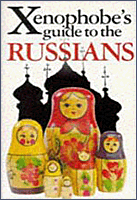






Contents:
 |
|||||
Shopping in Russia is an adventure, not a routine. In country shops, amongst the plastic potties, witches' broomsticks and baths stacked in the middle of the dusty wooden floor, you may find wonderful glass and china, washed up somehow as if from a shipwreck on a South Sea Island, or exquisite linen being sold for a song.
The word most commonly used during the Soviet period in connection with shopping was "defitsit" - shortage. People would carry with them a string bag known as an avoska, a "just in case", because a shopper might suddenly see the first supply for months of batteries or bananas, and wish to buy not just one, or one bunch, but as many as he or she could reasonably carry away. Now one can buy anything from a kitten to a complete hi-fi system from one of the hundreds of "kiosks" or "larioks" which line the streets near every metro station.
Many of these goods are imported by the new breed of merchant venturer known as "chelnoks" (shuttles), so called because they bustle out to Turkey, back to Russia, out to the Arab Emirates, back to Russia, out to South Korea, back to Russia and so on, seeking consumer goods to supply a market starved of luxuries for 80 years. The New Russians' French and Italian designer label clothes are sometimes made no further west than Derebasovsky Street, the garment district of Odessa, and expensive electrical goods labelled "Made in Taiwan" sometimes prove to come from a factory in Siberia. 90% of cars in Russia's Far East come from Japan and are right-hand drive. These regions threatened to secede from the Federation when a law was promoted in Moscow to make right-hand drive cars like these illegal.
Trading hours in Russia's new shopping facilities are long: little old ladies turn up as early as 5.30 a.m. to sell milk, bread and tinned goods and stay until after midnight. Newspapers, books and flowers can be bought in the perekhody (interchange passages) in the Moscow metro. Bread and seasonal fruit from the warm south - melons, tomatoes and grapes - are often to be found for sale on make-shift counters made from upturned crates at the subway exits. You are expected to have your own bag with you, and you do not get change without much theatrical performance, much sighing and searching in vain, until you say, "O.K., just give me the balance in prunes."
In Moscow it is not unusual to see someone selling books to motorists stuck in a traffic jam. As the free market takes hold, small independent Russian shops have sprung up. They sell an extraordinary and unpredictable mixture of wares: a rack of second-hand clothes in one corner and the latest Japanese equipment in another. Old-fashioned glass-topped counters may display chewing gum, antique silver ware and aspirins side by side and all priced by hand in black ink on cardboard dockets apparently made from torn-up cigarette packets.
If you wish to buy anything in the more traditionally-run Russian shops, the following rigmarole takes place. First, all items are displayed on racks behind the counter. If you like the look of something, you catch the attention of the one harassed assistant, rather as you would try to buy a drink during the interval of a West End hit musical. When you have succeeded in doing that, she will reach behind her and put the article on the counter for you to examine. The routine continues until you have found something you want (this palaver, unbelievably, also goes for books).
When you have given the goods the nod, the assistant will write out a little docket which you take and join the end of the queue for the cashier. There may be up to 20 people in this queue, especially if it is a food shop and all you came in for was some butter. Finally, you pay for your purchase, and go back with the receipt for the goods, look for the original assistant who by now will have gone off duty, wait while her relief looks under the counter for the item and then about an hour later emerge triumphantly with your 250g of butter/pair of tights/ latest Mills and Boon.
Strong men have been known to weep if they get out-side and their wife says, "Oh, you got unsalted, I wanted salted", or, "Those are the sort with the funny heel". A new phenomenon is the office equipment warehouse. This is an Aladdin's cave the size of an aircraft hangar containing everything from pencils to matching sets of executive leather office furniture, the latest IBM computers and even original works of art. Unlike the neighbourhood stationery store in the West, these places are guarded by men in army fatigues carrying Kalashnikovs.
One of the delights of Russian life is that no-one can be regarded as an infallible guide for long on the up-to-date minutiae of everyday living. No sooner does some pundit say "You can pay for anything you want in packets of Marlboro cigarettes" than hey presto, the kiosks are all suddenly selling Marlboros at less than you would pay in the duty free at Schiphol. Time after time it's back to the drawing board for the foreign know-all, and the first-time visitor can be as wise as the hoary old-timer.
2009 ╘ All rights reserved. Designed by TatkaCo: tania@email.it
